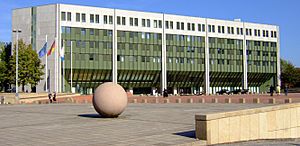Ministry for the Environment, Nature Conservation, and Nuclear Safety of Germany facts for kids
| Bundesministerium für Umwelt, Naturschutz und Reaktorsicherheit | |
 |
|
| Agency overview | |
|---|---|
| Formed | 6 June 1986 |
| Jurisdiction | Government of Germany |
| Headquarters | Bonn, Nordrhein-Westfalen |
| Employees | 814 |
| Minister responsible |
|
| Website | www.bmu.de/ |

The Federal Ministry for the Environment, Nature Conservation, and Nuclear Safety of Germany (BMU) is an important government office in Germany. It works to protect our planet and keep us safe. The main office is in Bonn, but it also has an office in Berlin.
Contents
What the Ministry Does
The Federal Ministry of the Environment, also called the Bundesumweltministerium in German, is in charge of Germany's plans for protecting the environment. This includes making sure our natural world is safe and healthy. The ministry also handles the safety of nuclear power plants, which helps protect the environment from harm.
The main minister gets help from two special assistants called junior ministers. These assistants help the minister in the Bundestag (Germany's parliament) and with making plans. They support the minister but don't make new rules themselves.
About 814 people work for the ministry. They are divided into six main groups, each focusing on different areas:
- Central Division: This group handles the general running of the ministry and some environmental protection tasks.
- Climate and Energy: This group works on stopping climate change, promoting clean energy like solar and wind power, and working with other countries on environmental issues.
- Water, Waste, and Soil: This team looks after our water supply, how we deal with trash, and keeping our soil healthy.
- Pollution and Health: This group focuses on preventing pollution, how it affects our health, and the safety of chemicals and plants.
- Nature and Species Protection: This team protects nature, different types of animals and plants, and looks after our countryside and forests.
- Radiation Protection: This group makes sure people are safe from radiation, especially from nuclear power.
Other Agencies the Ministry Oversees
The BMU also guides and works closely with other important environmental agencies:
- The Federal Office of Conservation (BfN) helps protect nature.
- The Federal Office of Radiation Protection (BfS) focuses on radiation safety.
- The Federal Environment Agency (Umweltbundesamt) gathers information and advises on environmental issues.
Expert Help for the Ministry
When the ministry needs special advice, it can ask for help from several expert groups. These groups are made up of scientists and specialists who give advice on things like:
- Environmental questions
- Global environmental changes
- Nuclear reactor safety
- Radiation protection
- Safety in case of accidents
- Technical safety of systems
- Environmental expert opinions
In 2005, the BMU had a budget of about 769 million euros. This was only a small part of the money Germany spent on the environment, because other government offices also work on environmental tasks.
History of the Ministry
The Ministry for the Environment was created on 6 June 1986. This happened about five weeks after a very serious nuclear accident at Chernobyl. The German government wanted one main office to be in charge of preventing such disasters in Germany and cleaning up if one ever happened.
The first minister in charge didn't stay for long. He later became the head of the government in the German state of Hesse. The next minister became the director of the UNEP, which is a big environmental group for the whole world. When Angela Merkel was the minister, the ministry faced challenges because economic problems became more important than environmental protection for a while.
In 1998, a new government came into power, which included the Green Party. Jürgen Trittin became the minister. During his time, ideas like an environmental tax and stopping the use of nuclear power became very important.
Ministers of the Environment
| Federal Minister for Environment, Conservation and Reactor Safety | ||||
|---|---|---|---|---|
| No | Name | Term start | Term end | Party |
| 1 | Walter Wallmann (1932-) | June 6, 1986 | April 22, 1987 | CDU |
| 2 | Klaus Töpfer (1938-) | May 7, 1987 | November 17, 1994 | CDU |
| 3 | Angela Merkel (1954-) | November 17, 1994 | October 27, 1998 | CDU |
| 4 | Jürgen Trittin (1954-) | October 27, 1998 | October 18, 2005 | Bündnis 90/Die Grünen |
| 5 | Sigmar Gabriel (1959-) | November 22, 2005 | October 27, 2009 | SPD |
| 6 | Norbert Röttgen (1965-) | October 28, 2009 | May 22, 2012 | CDU |
| 7 | Peter Altmaier (1965-) | May 22, 2012 | December 17, 2013 | CDU |
| 8 | Barbara Hendricks (1952-) | December 17, 2013 | In office | SPD |
 | Mary Eliza Mahoney |
 | Susie King Taylor |
 | Ida Gray |
 | Eliza Ann Grier |

